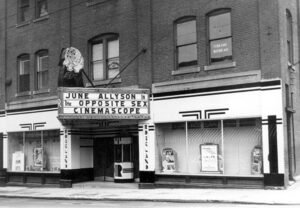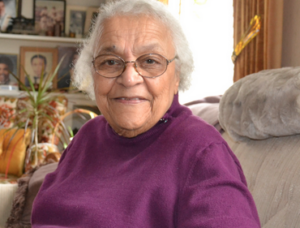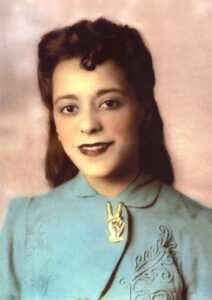Black History Month at Algonquin College’s Pembroke Campus
Posted on Monday, January 17th, 2022
Viola Desmond just wanted to watch a movie, but what happened to her on November 8, 1946 in Nova Scotia became a watershed moment in Canada’s civil rights movement. Desmond was a successful Black businesswoman, operating a beautician training school in Halifax and eventually expanding her business across the province, but it was car trouble that set her on a course that would make her one of Canada’s greatest historical figures.
On that fateful day in 1946, Desmond was travelling on business from Halifax to Sydney when her car started acting up and she was forced to pull into a nearby service garage in the small community of New Glasgow. The garage mechanic told her it would take a day to repair the vehicle so, in order to kill some time, Desmond decided to go to the Roseland Theatre and catch a movie.
At the ticket counter, Desmond requested and paid for a lower-level seat, but the ticket handler instead gave her a balcony seat, which was the segregated seating for Black patrons. Desmond tried to take a seat on the main level of the theatre anyway but was challenged by an usher and was eventually forcefully removed from the theatre and arrested.
She spent the night in the local jail and appeared the next day before a city magistrate where she was found guilty of defrauding the provincial government for not paying the amusement tax of one cent on the ticket. The penny represented the difference between the ticket for a balcony and the ground level seat. Without any legal representation, Desmond paid a fine of $26 that was levied against her by the presiding Judge, who awarded six dollars of court costs to the theatre general manager.
Nova Scotia’s black community was outraged. While Desmond’s husband wanted her to let things go, the Nova Scotia Association for the Advancement of Coloured People raised money to fight her conviction. She eventually lost her appeal on technical grounds and her case quickly faded from public consciousness. In 2010, long after Desmond’s death in 1965, she was posthumously granted a free pardon by the Nova Scotia government and was recognized for her contributions to the struggle for racial equality in Canada.
On February 1, Algonquin College’s Pembroke Waterfront Campus will kick off Black History Month with a special virtual speaker series presentation on the life and legacy of Viola Desmond by author and civil rights historian Graham Reynolds.
In 2000, Professor Reynolds was teaching a racial discrimination history course at Cape Breton University when he met the younger sister of Desmond, Wanda Robson. Robson was 73 years old but was interested in the course and enrolled. Reynolds describes her as the “life and energy of the classroom.”
“Having Wanda Robson as a student was a defining moment in my career. It began a two-decade long journey and collaboration to raise public awareness regarding the racial injustices of the past, especially in relation to the Viola Desmond story,” says Reynolds.
Robson went on to complete a Bachelor of Arts degree at the university, graduating at 77 years of age, and in 2010 she released her own book entitled, Sister to Courage: Stories from the World of Viola Desmond, Canada’s Rosa Parks.
In that same year, a free pardon was granted to Desmond posthumously by the Nova Scotia government, and the Viola Desmond Chair in Social Justice was established at the University. Reynolds was named as Chair and worked with Robson to write a book entitled Viola Desmond’s Canada, which was released in 2016. Two years later, they wrote Viola Desmond: Her Life and Times.
“The Viola Desmond story brings to light a long-forgotten chapter in Canadian history. And, for us to move forward as a nation and build a more just society, we must confront these darker pages of our past,” says Reynolds.
In November of 2018, 72 years after she was dragged out of the Roseland Theatre because of the colour of her skin and 53 years after she passed away, Desmond was honoured by becoming the first woman to appear on a Canadian $10 bill, confirming her place as one of Canada’s most courageous people and historical figures.
Canadians have been celebrating Black History Month for decades after the first move to recognize the contributions of Black Canadians was made by the city of Toronto which passed a proclamation in 1979. It wasn’t until 1995 that the House of Commons unanimously passed a motion declaring February as Black History Month.
On the 75th anniversary of Viola Desmond’s arrest in 2021, Prime Minister Justin Trudeau told Canadians, “Black people have helped shape our history and collective identify, and stood proud as leaders in communities across the country. Despite all this, systemic anti-Black racism still exists in Canada, and has undermined the livelihoods of Black Canadians and caused deep pain. This needs to stop.”
By taking a stand, Viola Desmond tried to stop racial segregation. Her cause remains active today.
Registration is now open for the Viola Desmond speaker series which will begin at 7 p.m. The session is free to students, employees, alumni and anyone over 60 years of age. You can register here: https://www.eventbrite.ca/e/speaker-series-black-history-month-kick-off-with-author-graham-reynolds-tickets-244517336937
(Posted by Jamie Bramburger, Manager of Community and Student Affairs)
- Posted in
- Waterfront Campus Blog



